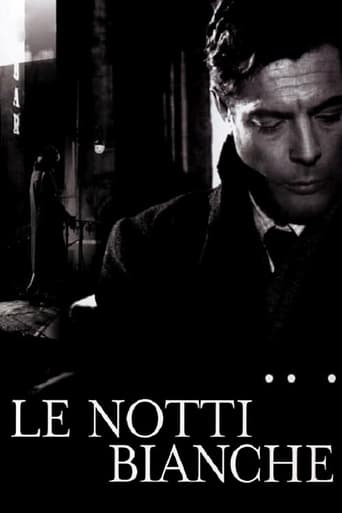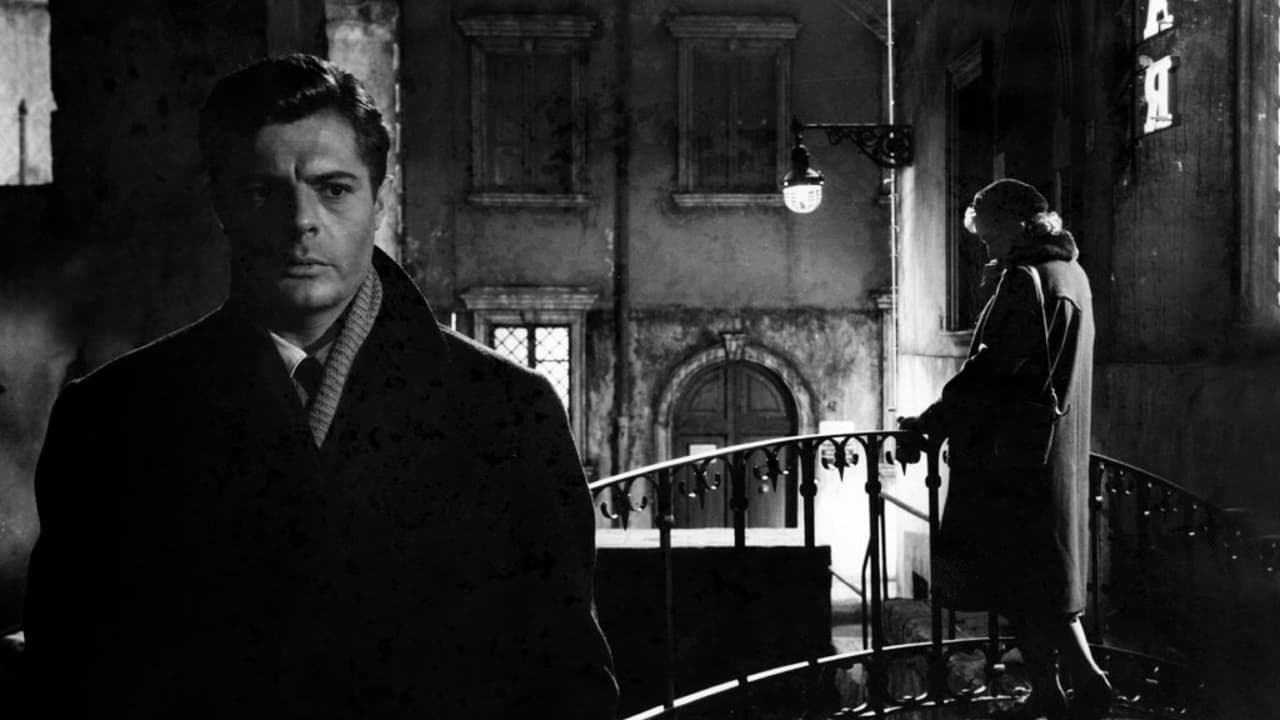evening1
An exquisitely told story of the "silhouette" nature of love -- I love you, and you're drawn to someone else.Director Lucchino Visconti has assembled a perfect cast for this Livorno, Italy-set version of the Dostoyefsky short story: Marcello Mastroianni as a lonely clerk, Maria Schell as the innocent homebody he falls for, and Jean Marais as the unnamed tenant with whom Natalia falls in love.The story is set in a magical-looking streetscape of dusky bars, lazy canals, and quaint little bridges. We share the perspective of the ready-for-love Mario as he roams the town, eager to connect. Anyone can follow a streetwalker but Mario is looking for something deep and authentic. Mastroianni is perfect in the role of a simple man on a heartfelt quest.Ms. Schell could not be more believable as a young woman so sheltered that her blind grandmother would keep their skirts pinned together. Natalia fell in love at first sight with the studly tenant, unwavering in her devotion -- despite the fact that he confides he must go away for a year -- no explanation possible. (My own theory is that he is serving a jail sentence. Yet Natalia is ready to wait, no questions asked.) What woman can't identify with this sort of hypomanic infatuation? What man or woman can't also empathize with Mario, who appreciates Natalia with every cell in his body, yet must accept she'll never return his ardor? Visconti expertly captures these poignancies."God bless you for the moment of happiness you gave me," Mario tells Natalia in the end, in an amazing bit of out-of-the-box thinking.We can't all win at love in every attempt at finding it. But we can be grateful for the richness of our experience along the way!
Bob Taylor
I had a great deal of pleasure in watching this film; early-period Visconti is very satisfying for me, ever since watching The Earth Trembles at a university film club back in the 1970's, followed by Rocco and His Brothers and Sandra. I don't care if Saint Petersburg doesn't look like a set at Cinecitta, or that Jean Marais's voice is dubbed, or that Maria Schell had to learn Italian very quickly in order to play Natalia and her accent is suspect (she's referred to as a "foreigner"). I don't care that Clara Calamai's (uninteresting) part is added to the story, probably so Visconti could repay a favour to one of his leading ladies. I don't worry about any of these things because a master film director is making a picture that he cares about, and his passion is shared by me, the viewer.Maria Schell, who made so many memorable films in the Fifties--Gervaise for Rene Clement and The Brothers Karamazov for Richard Brooks come to mind--is terrific as the lovelorn girl. Mastroianni is a real revelation: no world-weary sybarite as he was for Fellini, but a white-collar worker with limited prospects who is capable of sudden passion for the girl. It's a treat to see him gyrating in the cafe to Bill Haley's Thirteen Women.
HeadleyLamarr
Mario (Marcello Mastroianni) is a introverted young man who is new in town (a fantastical Livorno created just for the film). He encounters a young woman Natalya (Maria Schell) who appears to be waiting on a bridge. He saves her from some hoodlums and they become acquaintances. Over the next 4 nights we hear the stories of Mario and Natalya and come to learn why Natalya waits day after day at the bridge. Mario falls completely in love with Natalya and (in a departure from the Dostoyevsky story) throws away the letter she asks him to deliver to her returned lover. Will Natalya reciprocate Mario's feelings for her or will she forever pine for her lost love? The familiar tale unfolds beautifully in Visconti's version and the combination of sets, haunting use of lighting and fog, the river, the rain and snow, the narrow streets makes this a treat for the senses.The lead pair acted very well - Marcello was a heart-throb and Maria was beautifully vulnerable. Jean Marais as the tenant was a complete contrast to Mario the dreamer. He was earthy and big and solid.The movie had many beautiful moments but I MUST mention the night club scene - Marcello's dance was an inspired mix of gauche and genius. This is a beautiful film, well worth a watch and a few repeats. The DVD has some great insights into the period and what went into making the film.
Lee Eisenberg
Luchino Visconti's adaptation of Fyodor Dostoyevsky's classic novel fits in perfectly with post-WWII Italy. Marcello Mastroianni and Maria Schell play people from dissimilar backgrounds who meet one night in an Italian town and strike up a relationship.An important aspect is their backgrounds. He has moved in from out of town, but has quickly gotten to know part of the town. While she has lived in the town her whole life, her grandmother has kept her close and never allowed her to see the other side of the town; she earlier struck up a relationship with another man (Jean Marais), but he left and she doesn't know whether or not he'll return. So then, Marcello Mastroianni and Maria Schell meet on the bridge (the link not only between the two sides of the town, but between the characters' different worlds).Another representation of contrasts between the separate worlds is shown by the different types of music. In one scene, Maria Schell and her grandmother go to see "Barber of Seville", one of the all-time classic operas. In the restaurant scene, someone plays a Bill Haley song, emblematic of modern music. Luchino Visconti was no fan of rock and roll, but probably felt that it would make for an evocative scene in this case.But anyway, "Le notti bianche" (or "White Nights") remains an important part of Italy's cinematic history. I hope to see more of Visconti's movie's in the future.


 AD
AD



